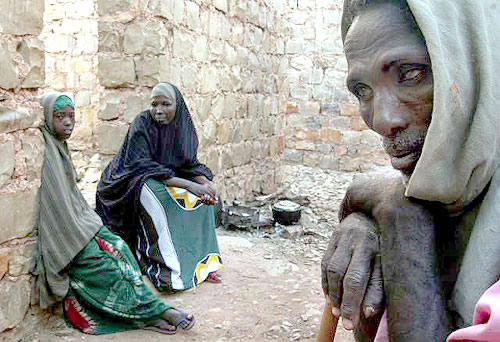 |
DEPENDENTS: Aden Osman’s father, Hassan, and two of Aden’s sisters sit in their home. Hassan, half blind, cannot work.
(Evelyn Hockstein / LAT) |
Previous Pages | 1 | 2 |
But fewer than 5% of Baidoa's youth attend school, Ali estimated, largely because of the $8-a-month fee.
Like many of his peers, Aden is restless. He said he wants to go to school, but doesn't care what he studies. He thought about getting married, but gave up because he has no money for a dowry. When asked what sort of job he'd like to do, of any in the world, he has no answer.
There's one job he knows he doesn't want, and it's the only one he can ever seem to find: gunman.
Like many young men in Somalia today, Aden finds his steadiest employment working as a "technical," a tough guy for hire by local warlords, businessmen and clan leaders.
He throws an AK-47 over his shoulders, jumps into the back of a dusty pickup truck with mostly older, larger guys, and does whatever he's told. Sometimes that's fending off attacks from a rival warlord. Most often he gets work guarding the bundles of khat leaves that land at the airport each day from Kenya.
Aden is hardly a threatening sight. His bony, narrow shoulders point through a too-big blue shirt. He wears a baseball cap on his small head. He carries the gun absent-mindedly, sometimes behind his neck like a headrest, other times upside down.
He said he hates the work. Other young men scrimp and save to buy their first weapon. Owning a gun makes work as a "technical" more lucrative. But Aden refuses to buy one, always borrowing a gun instead.
"I don't feel safe with a gun," he said. "I'm no militiaman. I'm not a fighter."
Most days his pay is a bundle of khat worth a dollar. For big battles, he gets another $1.50 cash.
He said he sells the khat and gives the money to his ailing father for milk or meat.
The family settled in Baidoa in 2003, after drought made survival in the bush impossible. Now they squat in a half-finished building on the edge of town with dirt floors and no roof, doors or windows. The family of six shares a small room with mattresses on the ground and worn sheets of gray plastic patching gaps in the walls.
Hassan, 60, and his wife, Awilyo, have lost three children in the last four years: one from malaria, another from a stomach ailment. A third died mysteriously after an apparent mental breakdown. She refused to go outdoors and spent the day babbling incoherently, grew pale and died.
Now Aden is the eldest of the four surviving children, and the only son. His parents fear they will lose him as well. They disapprove of his work. At the same time, Aden is the only one in the family with a job and they depend on him.
Hassan, a farmer, lost an eye to infection a couple of years ago. He has been unable to find work in the city, and he blames himself for the family's predicament.
"It's my fault," he said. "I'm the reason he has to pick up a gun, because I can't work."
Soon after the family arrived here, Aden caught the attention of Jerry Salat, a local businessman who runs the khat trade and controls the airport. Like Fagan in "Oliver Twist," Salat oversees a gaggle of poor young men who help run his enterprises, selling khat, collecting money and guarding supplies.
He first put Aden to work selling day-old khat, clearing out old supplies to make room for fresh deliveries. But Aden earned a reputation as a brave fighter while working briefly for a warlord, and soon Salat was using him occasionally for security.
"They're good fighters because they have nothing else to do," Salat said of his young employees. "They work for their stomachs."
Aden still looks for other jobs because he'd prefer not to work for Salat, and in any case he doesn't want fighting to be his full-time occupation.
He recalled his biggest battles of the last two years: one was against a rival clan that attempted to seize control of the airport, and another involved bandits who hijacked one of Salat's khat trucks. In both attacks, Aden said he and his friends trounced the other side.
In battle, his friends say, Aden is fearless. They boasted about their victories. But when asked about his role in the fights, Aden turned evasive and uncomfortable. His voice cracked like an adolescent and he insisted that he stayed behind in the truck or ran back to the village.
"I'm ashamed," he finally admitted. "Bullets are bad. My uncle was killed by bullets. I don't think carrying a gun is clean."
Asked how it felt to kill, he insisted that he never had, nor had he seen anyone killed. Aden's friends laughed at the statement as preposterous.
"We have killed so many, and seen so many killed," said Mohammed Aden Ali, 28, commander of Aden's squad, wearing camouflage pants and bullet clips crisscrossing his chest, Rambo-style.
At the end of another day on the back of a pickup truck working for Salat, Aden collapsed atop a bag of maize outside a local shop, grasping his daily pay: a small bundle of khat.
His conscience told him to sell the leaves and use the money for food for his parents and three younger sisters. But on this night, the lure of the khat was stronger.
After an all-night binge with friends, he awoke the next morning in the street, bleary-eyed and embarrassed. At first he denied chewing khat, insisting that he only had drunk coffee. But a pile of leaves around his feet gave him away. He shrugged.
"I take what I can," he said. "That's the life I have."
Previous 1 | 2 |
Source: LA Times, April 17, 2006